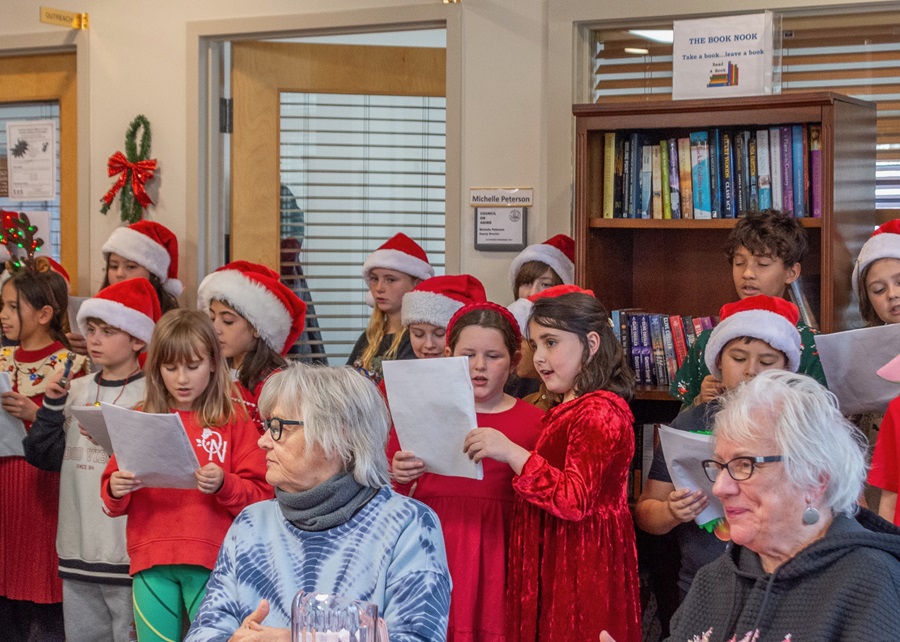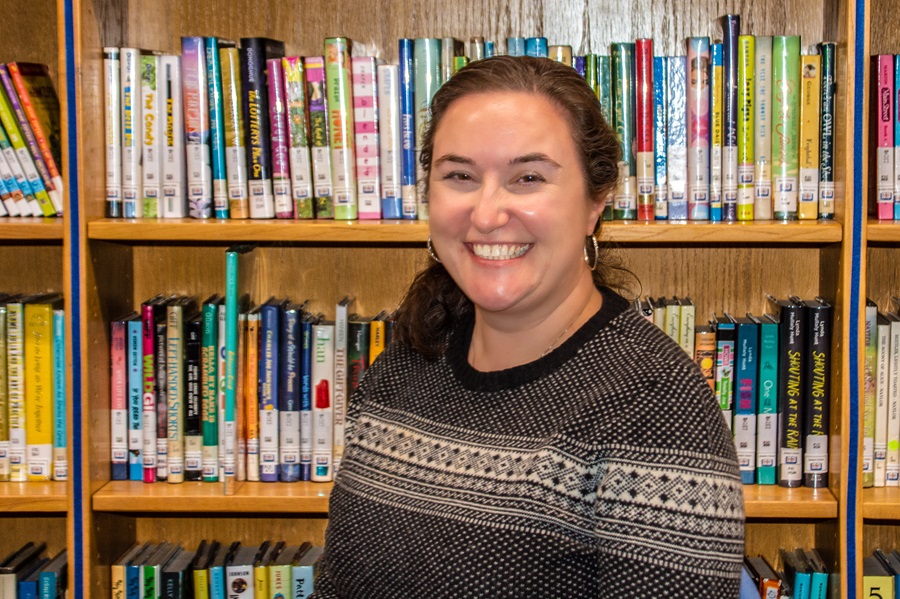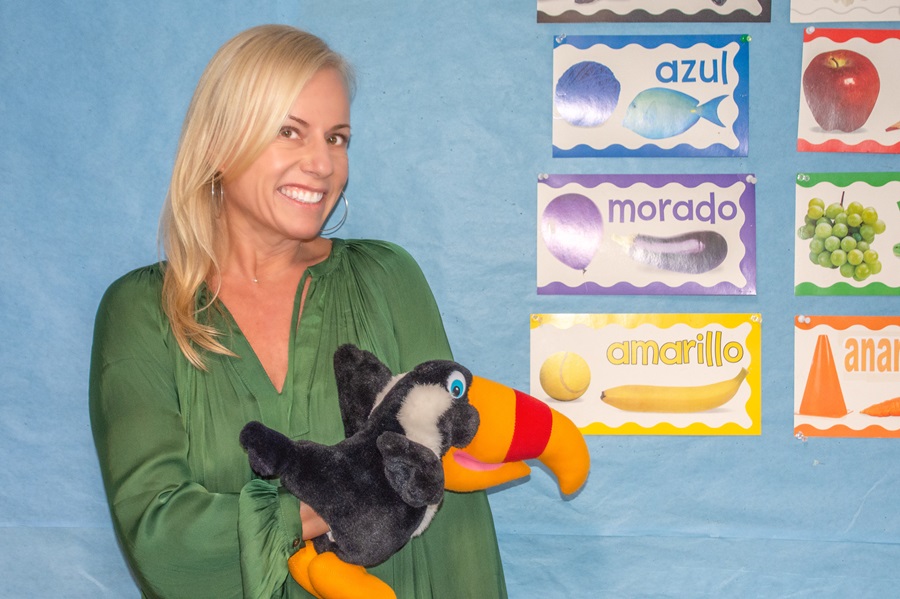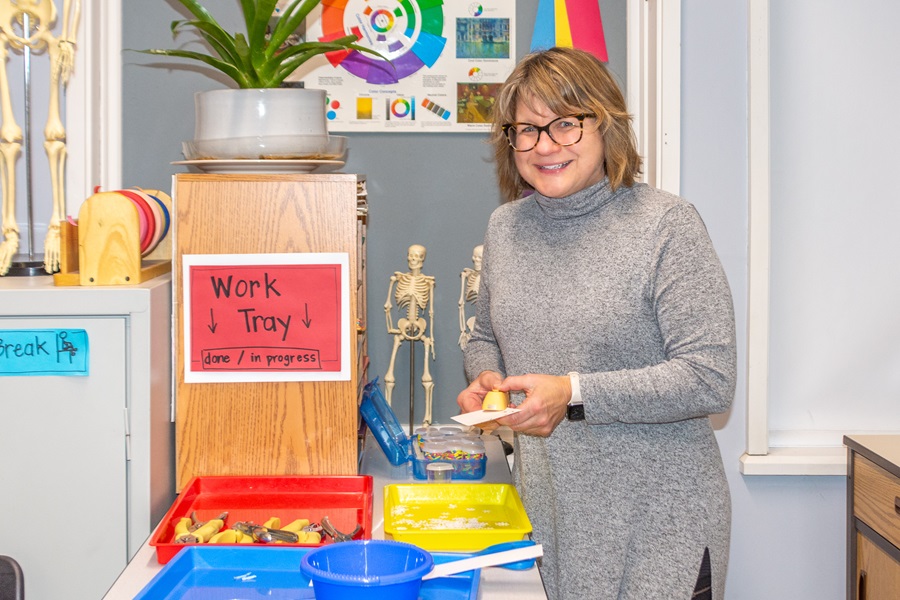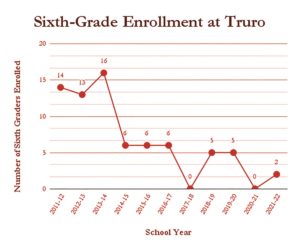Six bonsai trees in clay pots stand in a lineup under the fluorescent lights of the cafeteria at the Truro Central School, awaiting critique. The bonsai, all larches and junipers, still and stoic and seemingly content in their otherworldly smallness, belong to David Gavelek, who has been teaching a Winter Wednesday course called “The Art & Process of Creating Bonsai.”

The critics examining the lineup with curiosity are Gavelek’s students, whose bonsai projects, junipers, for now, await further attention on a nearby table. Later in the evening, the students should finish styling their junipers, says Gavelek. During the last two classes of the series, they’ll start on new projects: elms.
The students gaze thoughtfully at Gavelek’s own bonsai, brought from his home in Truro. “Last week I talked about rules for branch placement,” says Gavelek, pointing to a sturdy little larch. “How many rules does this tree violate?”

“All of them!” replies the class in chorus. Gavelek points to the tree’s twiggy top. Too much going on there, he says. Some branches threaten to grow parallel to each other — against the rules. “Handlebar branches” growing from opposite sides of the trunk on the same level are another don’t.
When Gavelek, seeking a solution, grabs a tiny branch and twists it, bending it around the trunk into a more aesthetically pleasing position, the crowd says, “Oh, wow!” When he rotates a relatively tall, leaning juniper to show off its flaws and points to an offending offshoot, the class chants, “Chop it!” Gavelek is not afraid to do that, he says, describing the time he sliced a homegrown honeysuckle bonsai in half.
Gavelek grew up in Chicago, where he gardened with his grandfather in a small vegetable plot. “I went through a phase where I had house plants,” he says. He lived in California for six years, where he had cactuses. Until he saw bonsai, sold from a stand.
Now, at his house in Truro, Gavelek cares for 75 bonsai, many grown, pruned, and picked from his own yard, rooted in clay pots and trays: honeysuckle, juniper, spruce, fir, pitch pine, maple, crabapple.
The word bonsai, translated from its original Japanese, means “planted in a container.” A bonsai is no special subspecies — it’s a regular tree, manipulated by pruning and wiring to become a miniature version of its full-size self. The pot does some of the work: with the roots constricted, the tree grows smaller and slower, and eventually the leaves shrink, too. One of Gavelek’s crabapple bonsai trees sprouts tiny purple flowers in the spring and grows tiny red apples in the fall.
“The purpose is to make your bonsai look like a tree, not to make your tree look like a bonsai,” says Gavelek. That’s something he learned from John Naka, a master bonsai cultivator who was born in Colorado but grew up in Japan, where he studied bonsai under his grandfather. Naka traveled the world teaching bonsai for 50 years; he died in 2004.

Some bonsai look like sculptures, Gavelek says, with their greenery seeming to float around the trunk. “But they don’t really look like a tree that you would see growing in a field,” he says. Others abandon such sculptural deliberateness. “Both are valid ways to express the art,” he says.
In the winter, without their needles, the delicate architecture of his larches is on full display. Deciduous trees are presented in bonsai shows in the winter for that reason, says Gavelek.
To learn the art, Gavelek at first read books and watched videos. But around 2010, he began to study with a bonsai master, Colin Lewis, who is originally from England and lives in Maine. Gavelek would go to Maine for workshops at Lewis’s studio. Before, says Gavelek, he made his bonsai too big. Lewis’s advice was to locate the most interesting part of the tree and make that the focus.
“He was always telling me, ‘You’ve got to get rid of this. Make it smaller, make it smaller,’ ” says Gavelek. In bonsai, “sometimes less is more.”

“Bonsai is part horticulture,” says Gavelek. “You have to keep the tree alive — otherwise it’s not bonsai anymore. It’s also part art. And there’s an aspect of bonsai that’s related to engineering — understanding how to take a solid branch and bend it.”
This is the first time Gavelek has taught bonsai. “It seems pretty natural,” he says, since he’s taught other things before — namely engineering and physics. He got his undergraduate and graduate degrees in physics from the Illinois Institute of Technology and retired this year from a career at Lockheed Martin, where he taught radar engineering.
Halfway through this class, released from their roles as inspectors, the students turn to their own junipers. Some touch the green needles tenderly. Others grab the scissors. The class has spent the past five weeks converting their trees, which began as natural bushes, into the cascade style, says Gavelek — the plant staying low and pouring over the side of its container like a sturdy green waterfall.
“Mine has gotten less green since I started cutting,” says Beth Breton, from Wellfleet, who is a little worried.
“Mine too,” says Judy Ward, from North Truro. “But he said it would grow back.”
A bonsai will grow — though a well-established one won’t grow much. The tree Gavelek has cared for the longest is a white spruce. It has stabilized at a height of 10 inches. “I’ve had that tree since 1996,” he says. “If it was growing in the wild, it would be 50 feet tall.”
It seems inevitable that people practicing bonsai will form relationships with their trees, as they wrap wires — Gavelek prefers copper, but the students are using aluminum — around its smallest branches to support them, bending to examine the trunk and tufts from every angle.
“I’ve never stared at a juniper bush for longer in my life,” says Mack Ellis, from Provincetown.

Danny Escola, also from Provincetown, is working on two junipers at once — both very small. “I love my little babies,” he says.
Gavelek makes the rounds, advising a cut here, a wire there. Two branches, equally long, sweep over the side of Ellis’s pot in a double cascade. Gavelek tells her to cut one shorter to avoid the look of bowed “cowboy legs.”
On the last day of the class, says Gavelek, the students will re-pot their junipers and elms, moving them from plastic to ceramic. They’ll use chopsticks to loosen the roots and transfer the trees to a different, more water-permeable soil. Then they’ll cover the soil with pieces of moss he’s gathered.
In smaller pots, the trees look taller and older. The illusion grows more real. There’s a feeling that the trees belong to some other world, where tiny birds and insects might roost and burrow in the outstretched branches, and a tiny person might sit and lean against the gnarled trunk.
There are rules for a better bonsai, about branch placement and balance and harmony. They must be learned, according to Gavelek, but mainly so that you can break them. To be both bold and patient, it seems, is required for this art.
“If you finish a painting,” says Gavelek, “you put your brushes away and you never touch it again.” Bonsai isn’t like that. Every tree is an ongoing project. “One of my crabapples was eaten pretty good by a bunny this winter,” he says. “Right now, it looks pretty weird. But it will grow back.”


